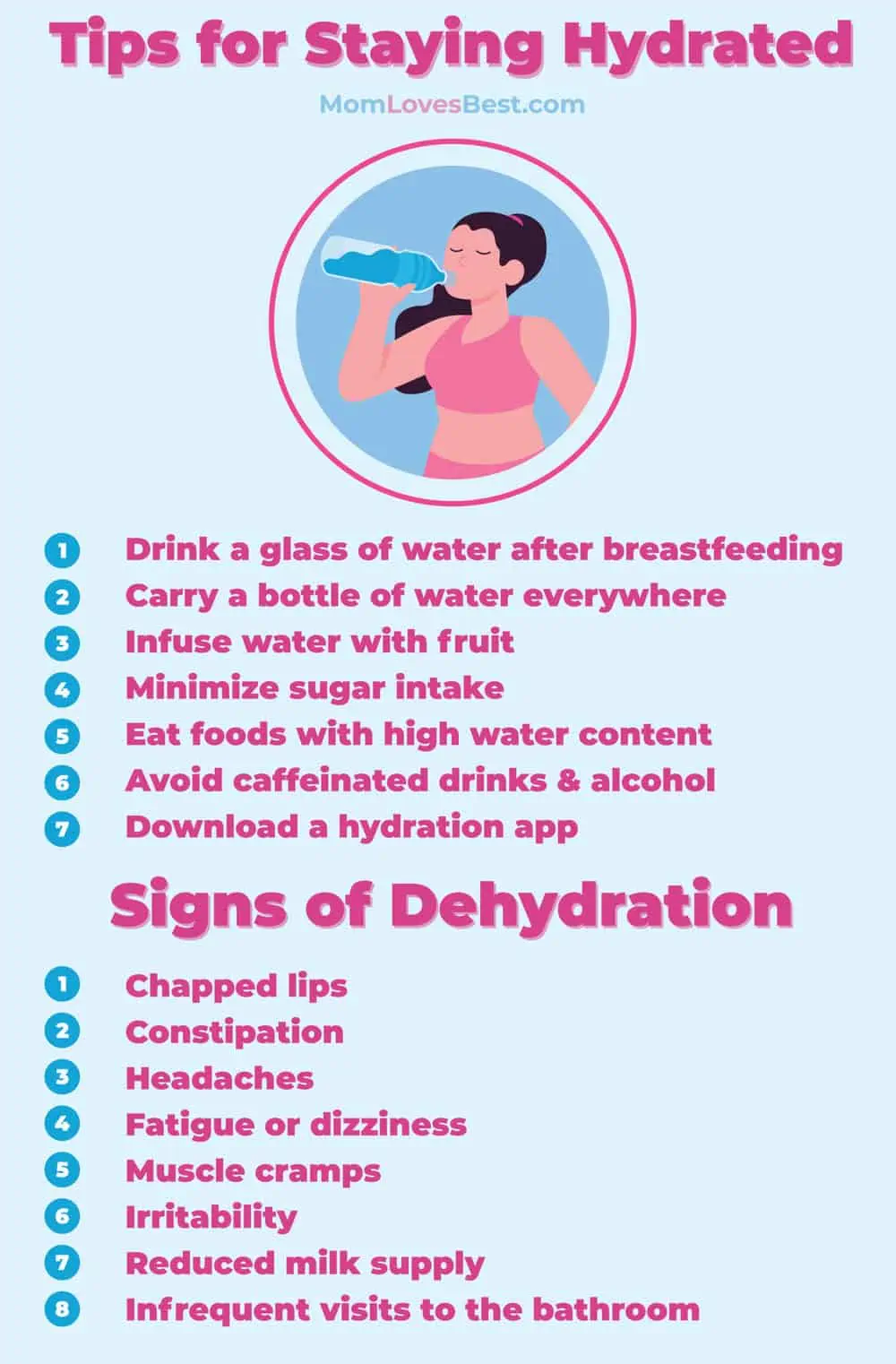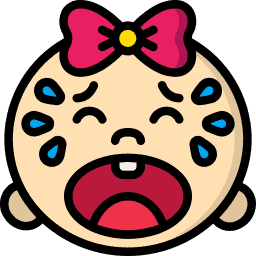If you’re breastfeeding, you’ve probably heard that you need to take in more water. But too much water isn’t a good thing either.
So how do you know how much water you need to drink while breastfeeding?
We’ve listened to what the top doctors, nurses, and lactation consultants have to say on the subject and will share what we’ve learned here. We’ll help you get the answer you’re looking for. Fill up your glass and follow along.
Key Takeaways
- Drink around 12 glasses of water daily when breastfeeding to stay hydrated and ensure sufficient water for both you and your baby.
- Drinking the recommended amount of water helps prevent constipation and keeps milk supply stable.
- Signs of dehydration include dark-colored urine, chapped lips, headaches, fatigue, and reduced milk supply.
- Tips for staying hydrated: keep a jug of water nearby, carry a water bottle, infuse water with fruits, and use a hydration app.
How Much Water When Breastfeeding?
It’s easy for a new mom to get caught up in her new duties and forget to drink enough water. A non-nursing woman should ideally drink around nine glasses of water every day. Does this amount change for the breastfeeding mom?
Over and above the recommended daily water intake, you’ll need to account for your baby’s needs. This means you’ll need to increase your daily intake by approximately three glasses per day, meaning you need to consume about 12 glasses (1). This will ensure that there’s sufficient water for both you and your baby.
But won’t that much water dilute my milk? Not at all. Here’s the thing, your body is made up of approximately 60% water, and around 87% of breast milk is water (2). You and your baby need water to function — think digestion, flushing out toxins, and everything else that water does for our bodies.
Other factors that can drain water from your body and require you to replenish it even more. These include hot weather, intense exercise, and illnesses that result in diarrhea, vomiting, or fever.
That said, there is such a thing as “overhydration,” which can force the body to push out excess water as urine. The result? Too many visits to the bathroom and a decrease in your milk supply since water has been diverted from the breasts.
While overhydration isn’t typically dangerous for a healthy woman, it can lead to dangerous changes in body chemistry for people with certain conditions (3).
Editor's Note:
Michelle Roth, BA, IBCLCWhy You Should Drink Water
While pregnant, it’s common to hear the phrase “eating for two.” The same goes for breastfeeding. Everything you consume can impact your health and your baby’s health, including the amount of water you drink.
Here are some solid reasons why you need to drink the recommended amount of water daily:
1. It Helps You Both Stay Hydrated
For the breastfeeding mom, your body knows that your baby’s nutritional needs must come first. This means some of the fluids in your body will be diverted to milk production.
In the process, you lose the fluids you need to function optimally, a scenario that may lead to dehydration. If you don’t replenish your fluids, your baby may also become dehydrated from a decrease in your milk supply (4). Drinking water replenishes lost fluids and keeps you and your baby healthy.
2. It Keeps Constipation at Bay
Constipation is anyone’s nightmare, pure and simple. I can’t even begin to explain the pain a new mom feels while trying to pass hard stools, especially after having just gone through childbirth. This pain is on another level.
Rather than dread bathroom visits or sit there screaming in silence as you pass a painful stool, drink more water to help you out.
3. It Affects Your Milk Supply
Here comes the age-old question: Does drinking water increase your milk supply? According to research published in the journal Pediatrics, drinking lots of water will not necessarily increase your milk production (5).
However, your milk supply will be affected when you don’t have enough fluids in your body. Low milk production means your baby will spend more time suckling to satiate their hunger but will get less milk overall.
Chances are that you will start experiencing dizziness, irritability, and even breast pain. Trust me; you don’t want to go there.
Top Signs That You’re Dehydrated
Signs of dehydration will vary from one mom to the next. If you’re feeling thirsty, you’re already mildly dehydrated. Dark-colored urine is one of the clearest indicators that you need to drink more water. These are some other signs:
- Chapped lips.
- Constipation.
- Headaches.
- Fatigue or dizziness.
- Muscle cramps.
- Irritability.
- Reduced milk supply.
- Infrequent visits to the bathroom. Urinating less than four times per day would be a clear indication that something isn’t quite right. Postpartum mommies tend to go more often up to 8 weeks after birth due to pressure on the bladder (6).
Tips for Staying Hydrated
With your hands full, you may find it hard to keep track of the water you need to drink daily. Here are some tips to help you along:
- Do you have a favorite breastfeeding spot? Keep a jug of water there, and refill your glass after you breastfeed.
- Carry a bottle of water wherever you go, and keep it within sight so you don’t forget to drink from it.
- If you can’t stand the taste of plain water, try infusing it with lemon, mint, cucumber, or strawberries.
- Minimize your sugar intake; sugar hinders your body’s water absorption.
- Help yourself to foods with high water content, like cucumbers, watermelons, and soups.
- Avoid caffeinated drinks, sodas, and alcohol, as these cause dehydration.
- Check out and download a hydration app, such as Waterlogged, on your phone. It will help you track your water uptake.












